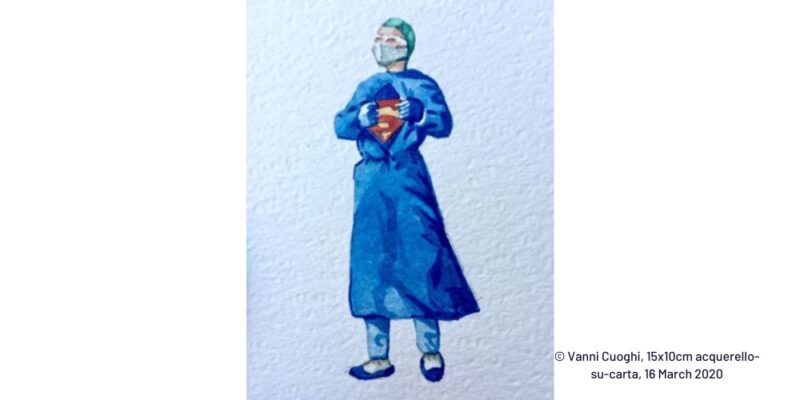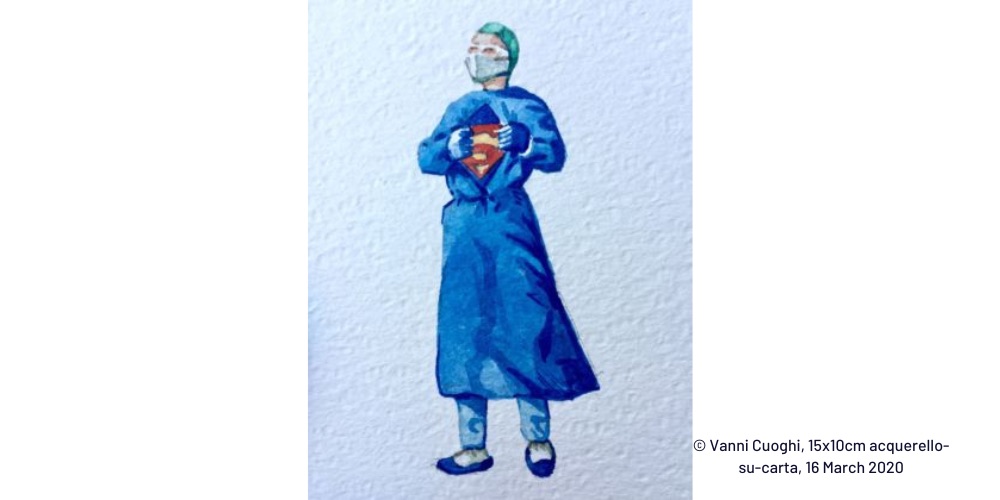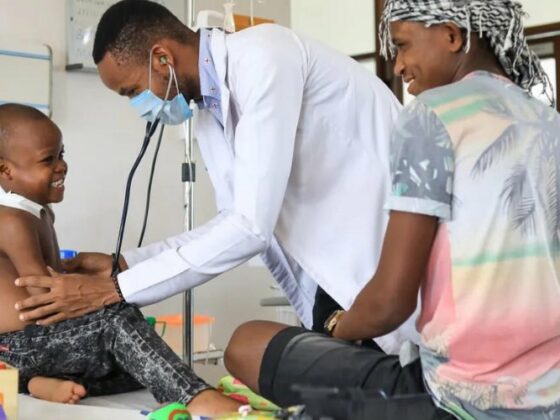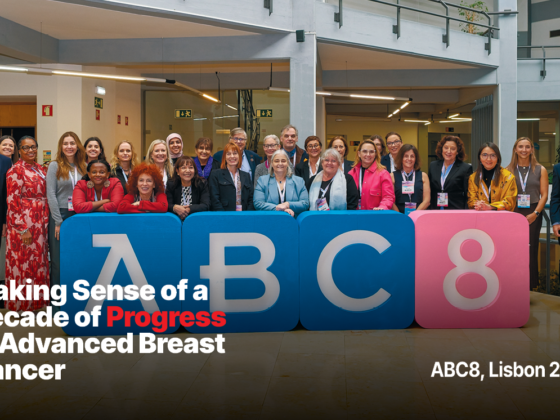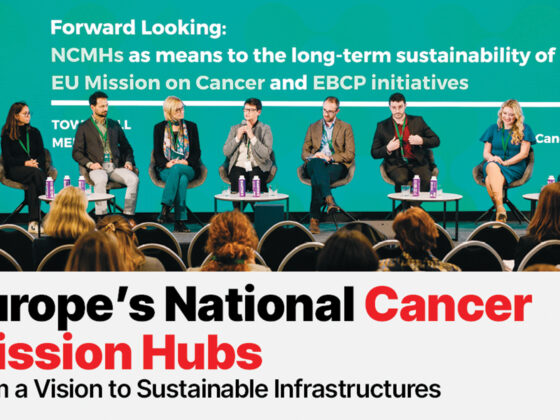Burnout. That short word barely conveys the dispirited cycle of weariness, negativity and powerlessness health staff experience when high aspirations to help and cure are consumed in an unattainable to-do list.
“You’re trying your best but nothing’s moving and you just feel like in a constant circle,” said one nurse in the UK trying to explain what it was like to work in an understaffed department. “It got to the point, I was on a night shift, and I just cried. I just sat and I cried and I said ‘I can’t do this.’”
The special risks of burnout among health service staff, who work under the unspoken expectation that other people’s needs come first, have long been evidenced in surveys. They work long hours and often in organisations facing resource restrictions or cutbacks. High demand, low resources: something has to break somewhere. And when it comes to oncology, where there is long-term contact with patients whose lives are being turned upside down, the demands can be particularly extreme.
“The very thing that draws people into oncology makes them especially vulnerable to burnout”
A 2019 Canadian study found that nearly three-quarters of the 418 oncologists surveyed experienced symptoms of burnout – emotional exhaustion, depersonalisation and feelings of a lack of personal accomplishment. A pan-European survey on the working conditions of young oncologists published in the Annals of Oncology in 2013 found that more than four in every five respondents from Central Europe suffer from burnout.
The very thing that draws people into oncology makes them especially vulnerable to burnout, believes David Cameron, Consultant Medical Oncologist at NHS Lothian, in Scotland, Professor of Oncology at the University of Edinburgh, and joint lead for the Edinburgh Experimental Cancer Medicine Centre.
“I think anybody in a profession where you are caring for someone with a problem is going to be at risk of burnout, if you carry any proportion of that individual’s physical or emotional pain internally,” he says. “I’m convinced that the people who make good carers have the ability to empathise with the people they care for, because you need that to read them emotionally, to help them psychologically.”
“And I think the risk of burnout may be greater for oncologists than some other medics, because there are not that many other professions where, not just day-to-day but month-to-month, sometimes year-to-year, you are dealing with individuals facing the challenge of their own mortality, which you have to help them address, as well trying to prevent them dying.”
Johan de Munter, President of the European Oncology Nursing Society, is so concerned about burnout and its causes that he made addressing it one of the priorities of his presidency. The need for self-care among cancer nurses, given the growing threat of burnout, was also the theme of this year’s European Cancer Nursing Day.
“We see people who feel emotionally lost, who are exhausted and cannot do any more and have a reduced sense of personal value”
Increasing care demands, staff shortages, lack of recognition, changing healthcare environments and lack of support mechanisms are all contributory, believes de Munter.
“I think for cancer care professionals, burnout and compassion fatigue are encountered on a day-to-day basis because of the stressors in their workplace,” he says. “We see people who feel emotionally lost, who are exhausted and cannot do any more and have a reduced sense of personal value.”
The arrival of Covid in 2020 inevitably made the strains on oncology staff worse. Already overstretched oncology workforces were faced with severe staff shortages, the need to protect highly vulnerable patients and the possibility of contracting a potentially fatal disease themselves. Absenteeism induced by burnout exacerbated the problem. The exact impact of that has yet to be thoroughly assessed, but two online surveys conducted by the European Society for Medical Oncology (ESMO) Resilience Task Force during Covid provided an indication.
The first survey, conducted between 16th April and 3rd May 2020, found that 38% of the 1,520 oncology staff participating had experienced feelings of burnout. The follow-up survey, conducted between 16th July and 6th August 2020, found that the proportion of respondents reporting feelings of burnout had risen to 49%. The proportion of professionals at risk of distress increased from 25% to 33% between the two surveys.
Fay Hlubocky, a specialist in psychosocial oncology at University of Chicago Medicine, recently concluded in an article in JCO Oncology Practice that “the realities of the COVID-19 cancer care era resulted in a multifold increase in oncologist distress,” and that as a result “organizations have a responsibility to support oncologists in living authentically to their intrinsic core values.”
So after decades of concern about oncology burnout, has the clear threat to staff psychological wellbeing caused by the pandemic brought the issue to a head? Is there now not just a new opportunity, but, as Hlubocky says, a moral imperative to address burnout in oncology and other fields of medicine head on? Certainly the number of articles written on the subject during the pandemic, and proposing solutions, would suggest a new momentum.
The individual or their working environment?
The emphasis in many is on building the resilience of individuals, making them less susceptible to burnout. Hlubocky, for example, proposes that cancer organisations “should prepare, plan, and implement interventions to build a supportive, ethical work climate to restore resilience using optimal, evidence-based programmatic interventions,” including stress management, peer-to-peer support and mindfulness-based approaches.
A recent scoping review on how to address and mitigate burnout in clinical oncology, published in Frontiers in Public Health, came to a similar conclusion, saying that organisational and individual interventions such as mindfulness and motivational packages, training in communication skills, stress management, relaxation, mindfulness, self-efficacy, resilience and work-life balance “can ensure job satisfaction, a supportive working environment, job retention for oncologists, and improved patient care.” Mindfulness to improve resilience is recommended in many papers.
But is individual resilience really the main cause of the problem? Does it offer the solution? Or is there need for a broader structural and cultural change at a workplace level?
Johan de Munter believes that change is needed at every level. Yes, there is definitely need for small scale local actions that might help support those working in oncology – where training and classes (including in mindfulness) will play a role. But on a broader level, employing organisations need to look at how staff are managed and whether they are following policies and best practice guidelines on staffing levels, support and supervision, occupational safety and resourcing.
“We need to give people opportunities to evolve, to learn, participate, raise their voice and be involved in their organisations”
de Munter argues that the most important priority is to create a democratic culture where employees can openly talk about the problems they are experiencing and address them together. “Acknowledgement is very important,” he says. “We need more deep democracy, where everybody can speak up. We need to give people opportunities to evolve, to learn, participate, raise their voice and be involved in their organisations next to care of patients. In that way you create an open culture, not a top-down culture saying what you have to do.”
David Cameron strongly echoes de Munter’s emphasis on giving oncology professionals opportunities to help shape the environment ‒ including the knowledge environment ‒ that they work in.
He argues that meaningful change hinges on creating structures that allow staff to step back, escape the everyday, and contribute to the bigger picture, which includes channelling oncology staff into activities that help them see that they can improve the lot of people with cancer, beyond caring for individuals. This might be through research, communication, teaching or other activities.
“One of the things that has enabled me to go on looking after cancer patients is contributing to research to try and improve their outcomes,” he says. “There is a strategic way in which organisations can say: yes, the reality of cancer can be awful, but there’s lots you can do to make it less awful in the future. To me that’s research. For some people it’s management, service organisation, or conducting service reviews, or work with patients focus groups.”
“But we all need something that offloads some of the pain we see from individual patients which can seem relentless. Something that allows you to step back from a series of bad news consultations, for example, and sit down and design something which will try and reduce the frequency of these awful conversations.”
“One of the things that has enabled me to go on looking after cancer patients is contributing to research to try and improve their outcomes”
This is the culture that Cameron, who specialises in breast cancer, sees in his colleagues and managers at the Edinburgh Cancer Centre in NHS Lothian. It is, he explains, a matter of sending out the right messages to clinicians from the moment they start work at an organisation. And then giving them the working structures to permit collaborative projects.
“I think it is essential in areas like oncology that, from day one, you do not give messages that create the expectation that you come in on a Monday morning, roll up your sleeves, go home on a Sunday night – and you’ve done nothing but look after sick people. This a recipe for fast burnout. You need to give them opportunities in their working week to think, to work, to cooperate, to collaborate, to construct. So that’s a matter of employers structuring. It needs to be embedded in the service philosophy of looking after your staff and thinking what do they need. And I don’t think that’s simply a matter of mindfulness training.”
Other changes would help. Cameron says organisations need to better understand what motivates oncology staff and gives them the kind of positive feedback that makes a potentially gruelling job rewarding. Because of clinicians’ often long-term relationship with cancer patients, knowing about positive outcomes when they have left treatment can give a real sense of purpose. Cameron remembers long-term follow-up clinics for breast cancer patients in the past, which allowed clinicians to see how they had contributed to people’s longevity and happiness. Unfortunately, such clinics rarely exist now – they are seen as contributing little to reducing the risk of cancer recurrence.
“Sometimes managers don’t understand that some long-term follow-up isn’t necessarily a waste of resources. As well as enabling measurement of the effect of the treatments given, and supporting a patient’s recovery, it can be an efficient way of giving positive feedback to the staff, and reducing burnout.”
The need for wider cultural and organisational measures to reduce burnout appears universal. But it is often hard for organisations to acknowledge, and in some countries for clinicians and researchers to make their voices heard.
The conclusions point to significant structural, organisational and resourcing problems as the root cause
Several studies have pointed to a significant oncology burnout crisis in eastern European countries. A 2020 study published in JCO Clinical Practice, and based on a survey of 637 oncologists in eastern Europe, concluded that 44% of participants were at high risk of emotional exhaustion, and nearly half had a diminished sense of personal accomplishment, with young oncologists most vulnerable. Its conclusions point to significant structural, organisational and resourcing problems as the root cause.
Lower financial and human resource investment in all aspects of oncology care compared with western Europe and lack of availability of radiotherapy units and modern radiotherapy techniques were key factors. “We hypothesized that burnout due to limited availability of radiotherapy resources hinders the ability of young oncologists to give the best possible care to patients,” says the study.
That said, overstretched health budgets are also impacting on oncology professionals in western Europe, in an indirect way, as Cameron points out. The practice of reducing costs by cutting the numbers, salaries and pay grades of secretaries and administrative staff only throws the work back onto frontline clinical staff, he says, reducing their ability to do what they’re paid for, and increasing burnout.
On the human resourcing side, de Munter points out that making it easier for cancer nurses to move across Europe, by harmonising education and recognition, could be good for the staff and help relieve pressure on health services.
“People need to think more about the mobility of oncology staff. Currently, different levels of education and recognition makes it difficult to move health care staff across Europe. If we recognise this as an important issue, and it becomes easier to move staff to areas of high demand, we will all be able to support each other much better. Having the right education and recognition can increase your resilience, make you feel empowered and reduce your chances of burnout.”
de Munter acknowledges that the root causes of burnout will vary from country to country, and that there is no one-size-fits-all solution. And certainly it is easier in some settings than others to create an open culture about the stresses, exhaustion and compassion fatigue that individuals are facing. Acknowledging that you are burnt out is hard in itself – but it feels almost taboo in many high pressure, results-orientated work settings.
“People don’t want to be labelled as burnt out. But I think it is possible to create an environment where people can talk openly about it”
“There is a lot of shame about the issue,” says de Munter. “As healthcare professionals we know we need to be passionate about the job and about patient care, so it’s very difficult to say ‘I can’t do it any more’. People don’t want to be labelled as burnt out. But I think it is possible to create an environment where people can talk openly to colleagues about it – this can be done, for example, by introducing supervision moments on the wards. Discussions also need to take place on a regional, national and European level to acknowledge that this is a real problem and doesn’t only reflect on individuals.”
Just as it’s hard for individuals to acknowledge they are struggling, it is not easy for organisations to stare the issue of burnout full in the face, acknowledges de Munter. It requires them to acknowledge the realities of resourcing problems, staff shortages and unmet needs. But the potential gains are enormous. Whatever the country or setting, openness and honesty are the key.
“The first step is always to recognise the problem and talk about it,” he says. “I’m convinced that the organisations that have the courage to do this, the power to do this, to reflect in this way, emerge much richer. It’s the responsibility of health care managers, hospitals, boards, to think about this and reflect on that problem, and if they do, they will empower themselves and be ready for current and future challenges.”
Image credit: Vanni Cuoghi, 15x10cm acquerello-su-carta, 16 March 2020

